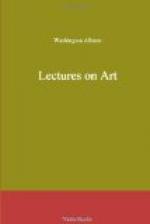In a still more striking form may we find the evidence of the law supposed, if we turn to the young, and especially to those of a poetic temperament,—to the sanguine, the open, and confiding, the creatures of impulse, who reason best when trusting only to the spontaneous suggestions of feeling. What is more common than implicit faith in their youthful day-dreams,—a faith that lives, though dream after dream vanish into common air when the sorcerer Fact touches their eyes? And whence this pertinacious faith that will not die, but from a spring of life, that neither custom nor the dry understanding can destroy? Look at the same Youth at a more advanced age, when the refining intellect has mixed with his affections, adding thought and sentiment to every thing attractive, converting all things fair to things also of good report. Let us turn, at the same time, to one still more advanced,—even so far as to have entered into the conventional valley of dry bones,—one whom the world is preparing, by its daily practical lessons, to enlighten with unbelief. If we see them together, perhaps we shall hear the senior scoff at his younger companion as a poetic dreamer, as a hunter after phantoms that never were, nor could be, in nature: then may follow a homily on the virtues of experience, as the only security against disappointment. But there are some hearts that never suffer the mind to grow old. And such we may suppose that of the dreamer. If he is one, too, who is accustomed to look into himself,—not as a reasoner,—but with an abiding faith in his nature,—we shall, perhaps, hear him reply,—Experience, it is true, has often brought me disappointment; yet I cannot distrust those dreams, as you call them, bitterly as I have felt their passing off; for I feel the truth of the source whence they come. They could not have been so responded to by my living nature, were they but phantoms; they could not have taken such forms of truth, but from a possible ground.
By the word poetic here, we do not mean the visionary or fanciful,—for there may be much fancy where there is no poetic feeling,—but that sensibility to harmony which marks the temperament of the Artist, and which is often most active in his earlier years. And we refer to such natures, not only as being more peculiarly alive to all existing affinities, but as never satisfied with those merely which fall within their experience; ever striving, on the contrary, as if impelled by instinct, to supply the deficiency wherever it is felt. From such minds proceed what are called romantic imaginings, but what we would call—without intending a paradox—the romance of Truth. For it is impossible that the mind should ever have this perpetual craving for the False.




